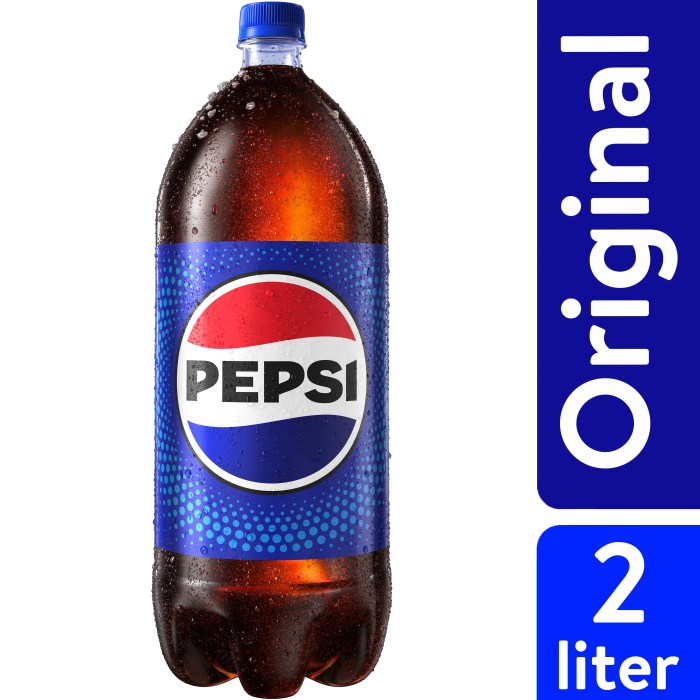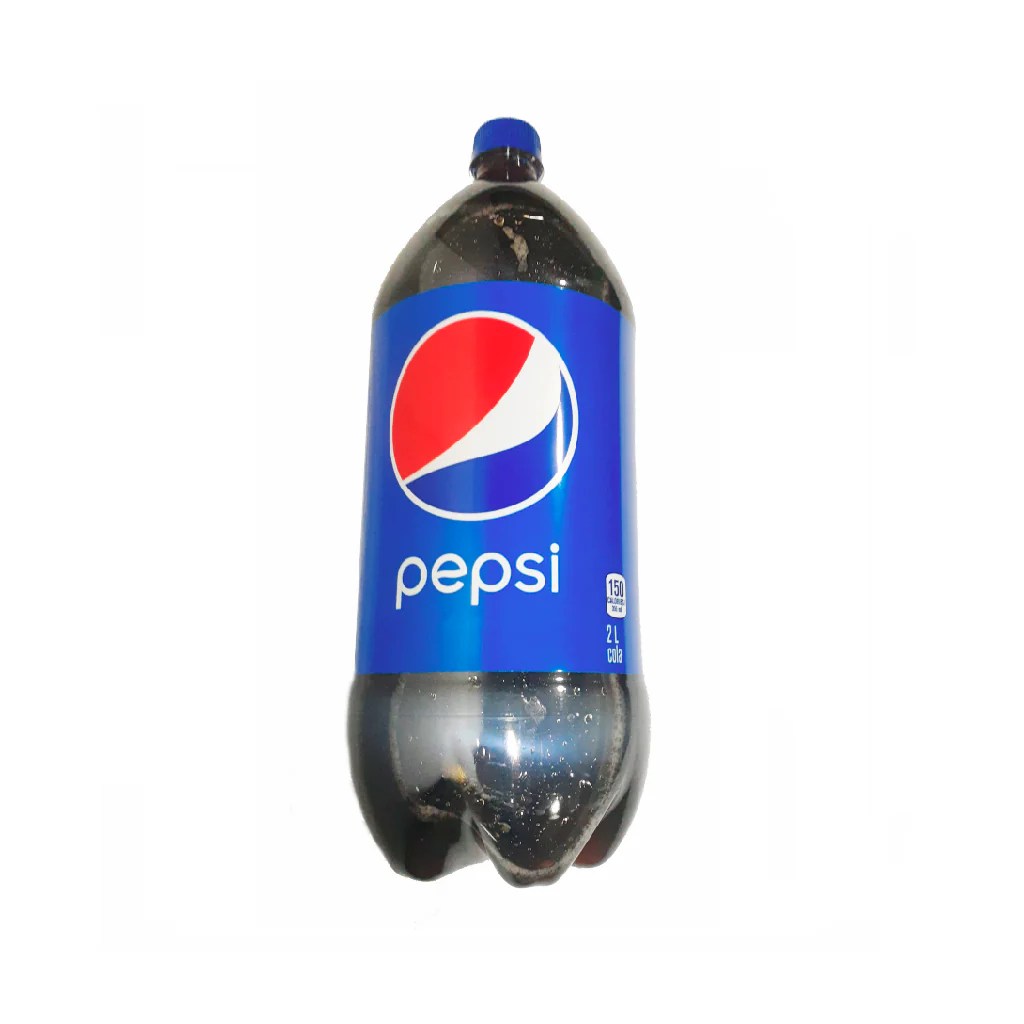Sugar Content Analysis of Pepsi (2 Liter)

Pepsi nutrition facts 2 liter – Pepsi, like many other carbonated soft drinks, derives its sweetness primarily from high-fructose corn syrup (HFCS) and sugar. While the exact proportions can vary slightly depending on the region and manufacturing process, HFCS typically constitutes a significant portion of the sweetener blend. Understanding the sources and effects of this sugar content is crucial for informed consumer choices.The primary sources of sugar in a 2-liter bottle of Pepsi are high-fructose corn syrup and sucrose (table sugar).
These added sugars contribute significantly to the drink’s overall sweetness and palatability. While naturally occurring sugars exist in some beverages, the high concentration of added sugars in Pepsi is the primary concern from a health perspective.
Potential Health Effects of High Sugar Consumption from Beverages
Consuming high levels of sugar from beverages like Pepsi is linked to various health problems. Excessive sugar intake is associated with weight gain, increased risk of type 2 diabetes, heart disease, and non-alcoholic fatty liver disease. The added sugars in these drinks provide empty calories, meaning they lack essential nutrients and contribute to overall caloric excess without providing any nutritional benefit.
Furthermore, the liquid nature of sugary drinks allows for rapid absorption of sugar into the bloodstream, leading to a quicker spike in blood glucose levels compared to solid foods containing the same amount of sugar. This rapid increase can place a strain on the body’s metabolic system over time.
Comparison of Pepsi’s Sugar Content to Recommended Daily Intake, Pepsi nutrition facts 2 liter
A 2-liter bottle of Pepsi contains approximately 230 grams of sugar. The American Heart Association recommends that added sugar intake should be limited to no more than 25 grams per day for women and 36 grams per day for men. Therefore, a single 2-liter bottle of Pepsi significantly exceeds the recommended daily added sugar intake for both men and women, potentially contributing to a considerable surplus of sugar in the diet.
This highlights the importance of mindful consumption and moderation when including such beverages in one’s diet. For example, consuming this entire bottle would exceed the recommended daily intake by a factor of approximately 8 for women and 6 for men. This drastic excess underscores the potential negative health implications associated with regular consumption of such beverages.
That two-liter bottle of Pepsi loomed, a sugary siren song whispering promises of fleeting refreshment. The sheer volume of its sugary contents felt overwhelming, a stark contrast to the lighter, arguably healthier profile I’d been considering – check out the details on peach long drink nutrition facts for a comparison. Ultimately, though, the familiar pull of the Pepsi, that comforting fizz, won out over any healthier alternatives.
That Pepsi’s nutritional information suddenly seemed less daunting after that comparison.
Impact of Added Sugars on Overall Health
The excessive consumption of added sugars, as found in large quantities in a 2-liter bottle of Pepsi, has been strongly linked to a multitude of adverse health outcomes. These include increased risk of obesity, type 2 diabetes, cardiovascular disease, and dental problems. The lack of nutritional value coupled with the high caloric density contributes to weight gain and can disrupt metabolic processes, leading to insulin resistance and increased inflammation.
Chronic consumption of such beverages can negatively impact long-term health and well-being. This underscores the importance of making informed choices regarding beverage consumption and prioritizing healthier alternatives.
Ingredients and Additives in Pepsi (2 Liter)

Pepsi’s 2-liter bottle contains a blend of ingredients that contribute to its characteristic flavor and texture. Understanding these components, their functions, and potential health implications is crucial for informed consumer choices. The precise ingredient list may vary slightly depending on location and production batches, but generally, a 2-liter bottle of Pepsi contains the following components.
The formulation of Pepsi, like many carbonated soft drinks, relies on a combination of sweeteners, acids, flavorings, colorings, and preservatives to achieve its desired taste and shelf life. Each ingredient plays a specific role in the final product, and some have generated discussion regarding their potential long-term health effects. A thorough examination of these components is therefore necessary for a complete understanding of the beverage’s composition.
Ingredient Breakdown and Functions
The following provides a detailed breakdown of the typical ingredients found in a 2-liter bottle of Pepsi and their respective roles in the beverage’s production and characteristics. Note that exact amounts may vary.
- Carbonated Water: Forms the base of the beverage, providing the fizz and volume.
- High Fructose Corn Syrup: A primary sweetener, providing sweetness and body. Concerns exist regarding its potential contribution to weight gain and metabolic issues due to its high fructose content compared to sucrose (table sugar).
- Sugar: Another sweetener, often sucrose, contributing to the overall sweetness profile. Excessive sugar intake is linked to various health problems, including dental issues and obesity.
- Caramel Color: Provides the characteristic brown color of Pepsi. Some studies have investigated potential links between caramel coloring and cancer, but further research is needed to establish definitive conclusions. The specific type of caramel coloring used in Pepsi is important in this context.
- Phosphoric Acid: Adds tartness and acidity, balancing the sweetness and contributing to the overall flavor profile. It also acts as a preservative.
- Caffeine: A stimulant that contributes to the beverage’s invigorating effect. Excessive caffeine consumption can lead to anxiety, insomnia, and other adverse effects.
- Citric Acid: Another acidulant that enhances the tartness and acts as a preservative.
- Natural Flavors: A complex mixture of flavor compounds that contribute to Pepsi’s distinctive taste. The exact composition of these flavors is often proprietary information.
- Potassium Citrate: Acts as a buffer to regulate acidity and enhance flavor. It can also contribute to the beverage’s overall mouthfeel.
Ingredient Categorization
The ingredients in Pepsi can be categorized for clarity, highlighting the different roles they play in the final product.
- Sweeteners: High Fructose Corn Syrup, Sugar
- Acids/Acidulants: Phosphoric Acid, Citric Acid
- Colorings: Caramel Color
- Preservatives: Phosphoric Acid, Citric Acid (indirectly)
- Flavorings: Natural Flavors
- Other: Caffeine, Potassium Citrate, Carbonated Water
Potential Concerns Related to Additives
Several ingredients in Pepsi have been subjects of ongoing scientific discussion regarding their potential health implications. While moderate consumption is generally considered safe, excessive intake of certain components, particularly sugar and caffeine, is linked to various health problems. The long-term effects of some additives, such as caramel coloring, require further research to establish conclusive links with potential health risks.
Consumers should be mindful of their overall dietary intake and limit their consumption of sugary beverages as part of a balanced lifestyle.
Frequently Asked Questions: Pepsi Nutrition Facts 2 Liter
What are the artificial sweeteners in Pepsi?
Pepsi uses aspartame and acesulfame potassium in some of its diet versions. Check the specific product label for details.
How does Pepsi’s sodium content compare to other colas?
Sodium content varies slightly between cola brands, but generally falls within a similar range. Check individual product labels for exact figures.
Is Pepsi 2-liter recyclable?
Yes, most PET plastic bottles, including 2-liter Pepsi bottles, are recyclable. Check your local recycling guidelines for specifics.
Does Pepsi contain caffeine?
Yes, Pepsi contains caffeine. The exact amount can vary slightly depending on the product and serving size.
